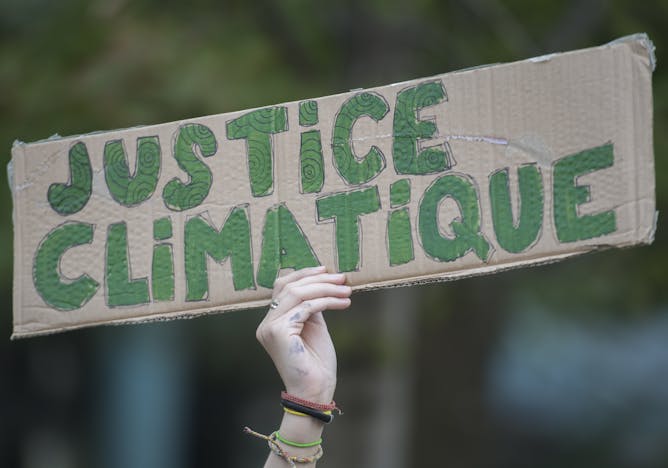|
|
|
|
In India, as the largest election in the world draws to a close, the subject of movies, TV and social media have come up a lot. Specifically, is Bollywood — an industry that churns out more than 1,500 movies a year — being used to influence voters? On today’s Don’t Call Me Resilient podcast, cinema studies scholar Rakesh Sengupta of the University of Toronto and gender studies political scientist Sikata Banerjee of the University of Victoria get into it. In our conversation, Sengupta said: “There has been this peculiar trend in Bollywood, where instead of inventing original heroes or superheroes, many Bollywood filmmakers now are relying on real
events, stories, places. They frequently retain the original names of the characters as well, but there’s significant rewriting of those histories.”
Banerjee and Sengupta both say these new films often display mythical physical strength from Hindu leaders against oppressors, who are often British or Muslim and often feature “alternative histories.” Some of the films are obviously anti-Muslim, while others contain more subtle messages. Some feature a modern India and its economic and development successes.
Prime Minister Narendra Modi and his right-leaning, fundamentalist BJP party, currently seeking a third term, are bolstered by ideas coming out of these films and the accompanying social media conversations swirling around them.
On this week’s Don’t Call Me Resilient podcast, Sengupta and Banerjee explore the intersections of this fascinating conversation, as the world awaits the official results from India’s election.
You may also be interested in revisiting our episode from last year with UCSC feminist studies professor Anjali Arondekar who is also co-director of UCSC’s Center for South Asian Studies. In the episode, we discuss the ways in which the global South Asian diaspora — including those in Canada — fuel the hype around Modi, who remains one of the world’s most popular (and controversial) world leaders.
Also today:
All the best.
|

|
Vinita Srivastava
Host + Producer, Don't Call Me Resilient
|
|

A man stands next to a poster of the movie ‘Article 370’ displayed at a theater in Guwahati, India. The movie is about the status of Jammu and Kashmir, a highly contested region in Northern India, and the film has been criticized for distorting history.
(AP Photo/Anupam Nath)
Vinita Srivastava, The Conversation
On today’s Don’t Call Me Resilient podcast, political scientist Sikata Banerjee and cinema studies scholar Rakesh Sengupta explain how cinema and social media in India may be helping to sway voters.
|

A wildfire forced thousands to leave their homes in and around Fort Nelson, B.C., in May 2024.
THE CANADIAN PRESS/HO-Ministry of Water, Land and Resource Stewardship
Stephanie Cleland, Simon Fraser University
Canada’s 2024 wildfire season will likely be even more severe than the unprecedented fires of 2023. Being aware of the risks, and taking some sensible precautions, can help keep you safe.
|

We have a responsibility to interrogate EdTech and surveillance companies’ claims of offering technological solutions to complex social problems.
(Shutterstock)
Beyhan Farhadi, University of Toronto
In an underfunded education system, in a context of deteriorating public supports, we are turning toward intrusive technologies to contain and control the social pain of young people.
|

Scarlett Johansson, shown here in a 2012 photo receiving her star at the Hollywood Walk of Fame, did not grant OpenAI permission to use her voice.
(Shutterstock)
Alex Borkowski, York University, Canada
The latest update to ChatGPT includes a voice assistant that sounds like Scarlett Johansson. The use of the “eerily similar” voice reflects a longstanding gender issue with technology.
|

Israeli Prime Minister Benjamin Netanyahu addresses a ceremony in Jerusalem marking Memorial Day for fallen soldiers of Israel’s wars and victims of attacks on May 13, 2024.
(Gil Cohen-Magen/Pool Photo via AP)
Heidi Matthews, York University, Canada
The prosecutor at the International Criminal Court publicized his request for warrants for Israeli and Hamas leaders. Publicly, Canada’s position aligns with Israel and the United States.
|
La Conversation Canada
|

Les impacts des changements climatiques dans les communautés s’accentuent et tendent à accroitre les inégalités associées.
La Presse canadienne/Graham Hughes
Hélène Madénian, Institut national de la recherche scientifique (INRS); Christina E. Hoicka, University of Victoria; Geneviève Cloutier, Université Laval; Laura Tozer, University of Toronto; Sophie L. Van Neste, Institut national de la recherche scientifique (INRS); Stéphane Guimont Marceau, Institut national de la recherche scientifique (INRS)
La transition écologique peut parfois se faire au détriment des communautés marginalisées. Toute démarche d’action climatique doit donc prendre en compte les enjeux d’équité et de justice.
|
Podcasts
|
-
Gemma Ware, The Conversation
Listen to Indrajit Roy talk about hope and politics in India on The Conversation Weekly podcast.
|
|
Arts
|
-
Robbie Morgan, University of Leeds
Terms like ‘woke’ and ‘emotional labour’ have lost their original meaning and there’s an issue with that.
|
|
Politics
|
-
Alex Prior, London South Bank University
The main characters are widely seen as dull but this election is already characterised by a narrative of chaos.
|
|
Science + Tech
|
-
Douglas Goodwin, Scripps College
Phone cameras are an example of what’s called computational photography. Digital tools built into these cameras can enhance your images in real time.
|
|
|
|
| |
| |
| |

|
| |
| |
| |
| |
| |
| |
|
|
|
|
|
|
|